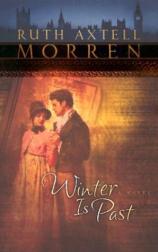Winter is Past
Review
Winter is Past
Historical fiction is tricky. How can you make characters with outmoded clothing, odd hairstyles, and dated speech patterns seem like fully realized human beings instead of stick-figure caricatures? Part of the challenge, of course, is to make sure that characters, once realized, are not parroting modern viewpoints in their dated speech patterns, either. In WINTER IS PAST, Ruth Axtell Morren has set herself a very high bar: not only is she writing about Regency England, one of the most intricately mannered periods for period novels, she has chosen to delve into two subsets of Regency people --- Methodists and Sephardic Jews.
Morren, herself descended from Sephardim (that segment of Jewry that derives its traditions and some ethnicity from Spain), brings an intriguing element into her novel by making Simon Aguilar a Sephardic Jew who has made a nominal conversion to Christianity in order to realize his goal of a political office. As Morren points out in her brief preface, conversos (as men like Aguilar were known) were more common in nineteenth-century England than most people know, the most famous of them being Prime Minister Benjamin Disraeli.
Aguilar himself is something of a sacrificial lamb: his family "allowed" him to be the converso because there were enough sons to take over the more important roles of family businesskeeper and rabbi-in-training. But his political ambitions are tempered by personal tragedy: his wife died in childbirth, and now his beloved young daughter Rebecca is wasting away from an unnamed disease.
When Althea Breton arrives to act as Rebecca's governess (no one will use the word "nurse" lest the girl become anxious), she certainly harbors no designs on Simon Aguilar. Breton, born into the nobility but hiding some sad secrets, has renounced her title of "Lady" and embraced the outré Methodist faith. She has spent some years residing in a London slum and living her faith by caring for the city's indigents. While she responds to her brother's call to act as Rebecca's caregiver, she does so only for the girl's sake; Breton hopes that when she is no longer needed in the Aguilar household, she can return to her life in service to the poor.
Circumstances conspire against her, however --- for as Breton's life becomes more entangled with Rebecca's, it also becomes more entangled with Rebecca's father. It is here that historical fiction becomes tricky, because some of Breton's scenes with Rebecca have a slightly sticky feel of bad Sunday School lectures. These are balanced, however, by lively and realistic vignettes with Aguilar's family, especially a terrific depiction of an English Sephardic wedding during which the young bride's words to Breton resonate with more compassion and warmth than anything between governess and charge.
The love between Breton and Aguilar grows and the two acknowledge it, but they are cautious because of their individual backgrounds and secrets. One scene in particular is very moving, in which Breton shares a wrong done to her, one that we think of as very modern --- but Morren succeeds in keeping the confession in tune with her chosen era.
When the couple overcomes the obstacles in their path and finds happiness together (as in all good romance novels), there is great rejoicing. The novel's title comes from that most romantic of Scriptures, The Song of Solomon: "My beloved speaks and says to me: 'Arise, my love, my fair one, and come away; for now the winter is past, the rain is over and gone.' " Still, readers may wonder whether Aguilar's conversion to his beloved's faith would have come so quickly and easily, if at all, and whether it would have been more interesting to see him convert not to her faith, but to return to his own. But, of course, that's not orthodox for a Christian novel.
Reviewed by Bethanne Kelly Patrick on December 1, 2003
Winter is Past
- Publication Date: December 1, 2003
- Genres: Christian
- Paperback: 352 pages
- Publisher: Steeple Hill
- ISBN-10: 0373785097
- ISBN-13: 9780373785094





